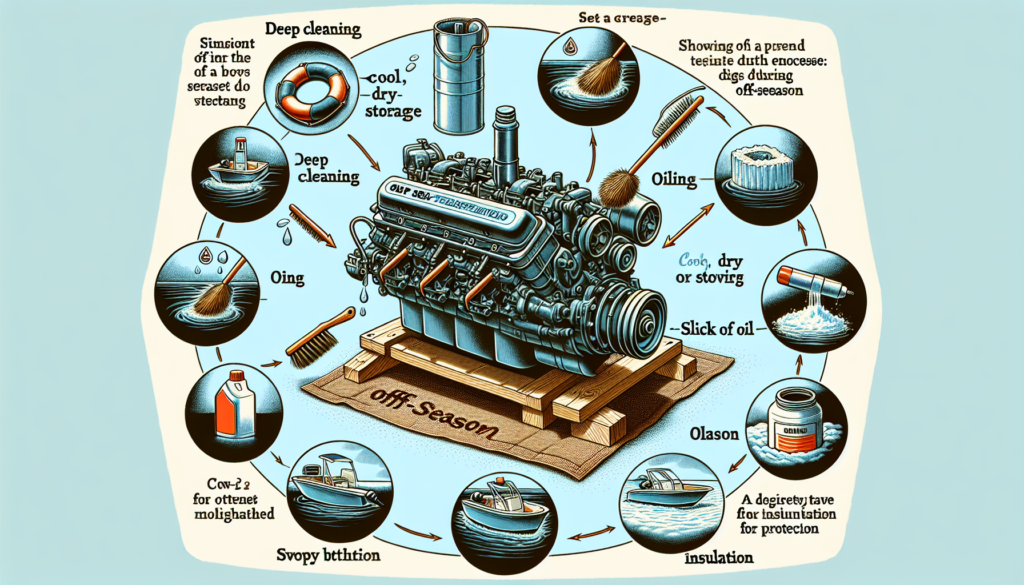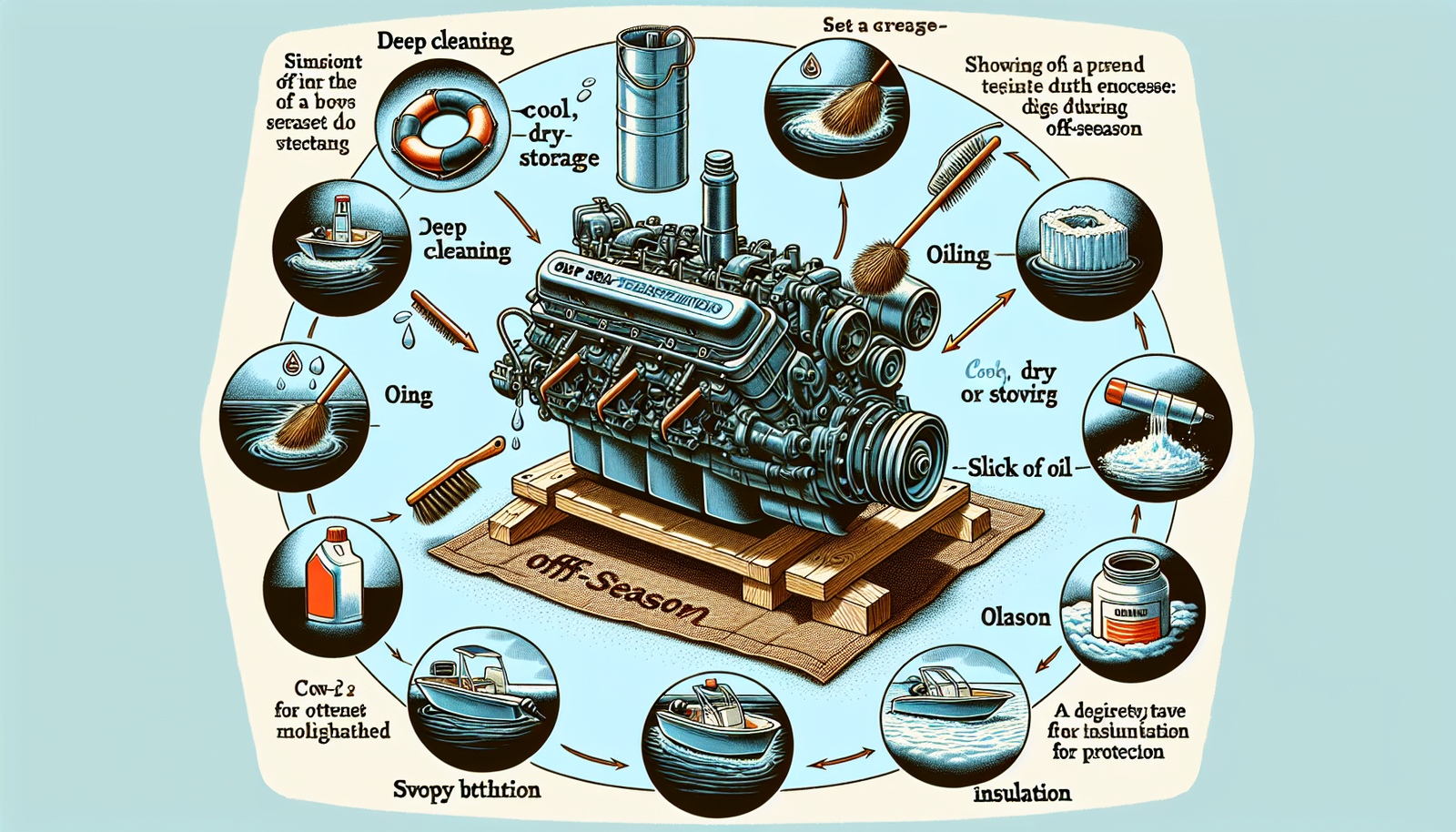During the off-season, your trusty vessel needs to be taken care of, especially its engine. In this guide, “best practices for storing your boat engine in the off-season“, you’ll be walked through the process of properly storing your boat’s engine to ensure it remains in top-notch condition for next sailing season. The health and longevity of your engine are paramount, and this article provides techniques and tips that will guard against costly damages and keep your boat shipshape, even during the months it’s not cutting through the waves.
Understanding the Need for Proper Storage
Being an owner of a boat, sailing through clear waters and feeling the breeze on your face can be a satisfying experience. However, in order to continue enjoying these moments, it’s important to ensure that all aspects of your boat – particularly, the engine – are well-maintained. One of the crucial means to preserve your boat’s engine is to store it properly during the off-season.
Significance of off-season boat engine storage
To enjoy your boat’s longevity, off-season boat engine storage isn’t just an added precaution, but an absolute necessity. It helps prevent the engine from certain damages, such as corrosion and rusting, which if left unattended, could result in major mechanical issues.
Deterioration risks associated with improper storage
Lack of proper off-season storage may lead to the deterioration of your boat’s engine and its parts. The risks include corrosion due to moisture, cracking of rubber and plastic parts due to temperature fluctuations, and even rust on metallic parts from oxidation. All of these could lead to premature failure of the engine or costly repairs.
The impact of the environment on boat engine during storage
The environment can significantly impact your boat’s engine during storage. For example, drastic changes in temperatures can affect the motor, while humidity can lead to moisture-related complications. Therefore, it’s crucial that the environment where you decide to store your boat engine is well-controlled and dry.
Inspecting the Engine before Storage
Before you start preparing your boat for off-season storage, it’s essential to give the engine a thorough inspection.
General check-up of engine parts
Start by inspecting all of the engine’s parts to identify any signs of problems, such as wear and tear, leaks, and damages. This includes examining the outdrive, the impeller, the propeller, and all rubber parts.
Identification of potential issues
After conducting the general check-up, you should be able to identify potential issues. These [problems] may not affect the engine’s performance immediately but could become significant over time, especially if left unattended during the off-season.
Addressing damages or leaks immediately
If you’ve identified any damages or leaks, do not hesitate to address these issues immediately. Doing so will ensure that the engine is in the best possible shape before you put it away for storage.
Documenting the engine condition
Finally, document the condition of the engine, including any damages or potential issues. This documentation will be crucial when you’re ready to use your boat again in the next season.

Proper Cleaning of Boat Engine
Deep cleaning the engine should be on your list of things to do before storing your boat.
Pressure washing the engine
Pressure washing the engine will help remove accumulated dirt and grime. Be careful while pressure washing, ensuring you’re not damaging any delicate parts.
Drying to prevent rust
After washing, dry the engine thoroughly. Any leftover moisture can lead to rusting or corrosion, damaging the engine and its parts during storage.
Using specialty marine cleaners
Use specialty marine cleaners to wash off any stubborn residue that might have stayed after pressure washing. These cleaners are specially formulated to handle marine grime and salt deposits without damaging engine parts.
Cleaning the fuel system
The fuel system should also be cleaned to eliminate any contaminates, such as water or dirt, which could corrode the system when the boat is not in use.
Change of Fluids and Filters
Changing fluids and filters is an important step before placing your boat engine into storage.
Changing engine oil and filter
Ensure you replace the oil and filter of the engine. Old oil can contain contaminants that can cause the engine to degrade.
Coolant replacement
Replacing the coolant can help to prevent corrosion and freezing in the engine block.
Changing transmission fluid
Changing the transmission fluid of your boat helps in enhancing the lifespan of the engine.
Fuel stabilizer addition
Ensure to add a fuel stabilizer to the tank and run the engine for a few minutes. This will help maintain the quality of fuel which could degrade over time.

Disconnection of Battery
The battery is a vital component of your boat which also needs special attention during storage.
Removing the boat engine battery
Remove the boat’s battery, which aids in preventing any chance of it draining fully while in storage.
Cleaning and charging the battery
After removing the battery, clean the terminals and charge it completely. A fully charged battery will maintain its lifespan far better than a depleted one.
Proper off-season storage of boat battery
Store the battery in a cool and dry place, and maintain its charge periodically.
Fogging the Engine
Fogging your engine is beneficial as it provides a coating to the internal engine parts preventing rust and corrosion.
Explanation of engine fogging
Engine fogging involves spraying a specific protective oil that provides a protective layer on the engine’s internal parts.
Choosing the right fogging oil
Choose the right fogging oil suitable for your boat’s engine. Different engines might require different types of oil.
Process of fogging boat engine
For fogging the engine, spray the oil into the air intake while the engine is running until it stalls. This ensures the entire engine is covered with a layer of fogging oil.
Protecting the Boat Engine from Corrosion
Proper protection of the boat engine from corrosion is crucial due to the harsh marine environment they are exposed to.
Applying anti-corrosion sprays
There are specific anti-corrosion sprays available that you can apply to your boat’s engine to protect it from rust and corrosion.
Covering raw water cooling system
Cover the raw water cooling system with non-toxic anti-freeze to prevent the coolant channels from corroding.
Mention of why marine engines are more prone to corrosion
Marine engines are especially susceptible to corrosion due to water and salt exposure, and these factors make anti-corrosion measures even more important.
Securing and Covering The Engine
Properly securing and covering your engine can protect it from external environmental elements during the off-season.
Importance of proper storage covers
Using a protective cover for your boat engine during storage can prevent dust, moisture, and insects from damaging it.
Other suitable cover options
If you don’t have a protective cover, other options could include waterproof tarps or a custom boat cover.
Maintenance of covers and ties in off-season
Covers and ties should be checked and maintained throughout the off-season. This helps ensure they remain in good condition protecting your engine.
Maintaining Proper Ventilation
Adequate ventilation is necessary to prevent moisture buildup in your boat and its engine during storage.
Ideal storage conditions for boat engines
The ideal conditions for engine storage involve a dry, well-ventilated area. This prevents any potential mold and mildew growth.
Preventing moisture buildup
Proper ventilation is key to preventing moisture buildup. This can be achieved by installing vents, using dehumidifiers, and frequently checking the boat in storage.
Importance of regular checks during storage
Make sure to regularly check on your boat and its engine in storage. This can help identify potential problems before they become significant and resolve any issues promptly.
Importance of Professional Assistance
While many storage steps can be done on your own, there are times when professional help could be necessary.
When to seek for professional help
Seeking professional assistance is advisable when complex tasks need to be carried out, such as engine fogging, or when you’re unsure about something.
Enlisting marine mechanic for more complex tasks
A marine mechanic can provide valuable insights into more complex tasks, ensuring your boat is stored correctly and safely.
Maintenance service options during off-season
Many marine professionals offer detailed off-season maintenance and storage services. It may be worth considering these services to protect your investment in your boat engine.
Conclusively, with the correct methods and a little effort, you can safely store your boat, ensuring your engine will be in optimal condition when you’re ready to hit the water again. Always remember, your boat engine is a significant investment and its longevity largely depends on how you take care of it.


[…] how you store your boat’s engine during off-seasons and the maintenance performed can impact its longevity and reliability. Proper preservation methods can prevent unnecessary damage and expensive repairs. […]